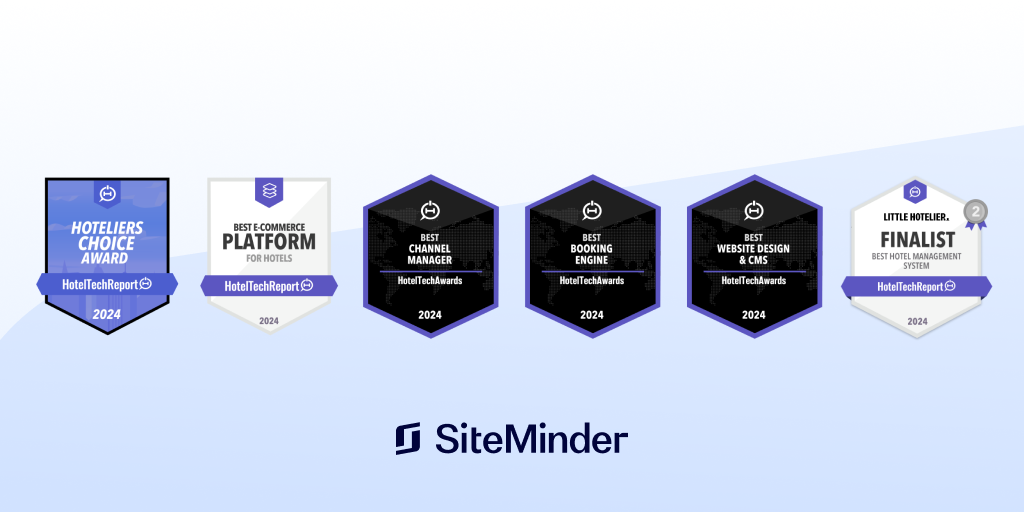Why is hotel channel manager comparison important?
A hotel channel manager comparison is crucial to ensure that hoteliers are investing in the best software for their business. After all, it will form the backbone of your hotel distribution, and failing to find the best fit for both now and the future could end up doing more harm than good.
Comparing hotel channel managers helps you get the best value for money and its benefits are multi-faceted. Channel manager comparisons will help you determine which software meets your needs, especially when it comes to simultaneously distributing your rooms across online travel agents, tourist centres, and anyone else who books rooms on behalf of guests.
Using the right channel manager will also empower everyone to access your live availability and rates, updating your inventory in real-time. However, not all channel managers are created equal which means that you won’t always see a satisfactory return on investment for your property.
To give guests a great experience and also run a profitable business, you need to research channel managers and make sure you’re choosing the best one for your hotel.
Table of contents
What is the difference between a switch and a channel manager?
While a switch is focused on the seamless transmission of data, a channel manager is centred on optimising and managing that data across various online platforms. Both switches and channel managers play pivotal roles, but they serve distinct functions.
What is the difference between CRS and channel manager?
A central reservation system (CRS) switch, often referred to as a distribution switch, acts as a conduit, facilitating the transfer of data between a hotel’s property management system (PMS) and various distribution channels. It’s the technological backbone that ensures inventory, rates, and other essential data are accurately relayed between systems.
On the other hand, a channel manager is a more comprehensive tool designed to manage and synchronise a hotel’s inventory across multiple online distribution channels, such as online travel agencies (OTAs such as Booking.com, Airbnb, and Expedia), global distribution systems (GDS), and direct booking platforms.
What is the role of a channel manager?
The primary function of a channel manager is to ensure real-time updates across hotel bookings channels, preventing overbookings and rate discrepancies.
Transform your success with the best channel manager
Harness the power of SiteMinder's industry-leading channel manager for optimal online visibility and revenue generation.
Learn more
Key factors to consider when comparing channel managers
To compare channel managers, hotels need a structured approach for analysing various factors that are essential for their business needs. Here are 5 major considerations in order to compare channel managers effectively:
1. Comparing channel manager specifications
List down your specific requirements. Think about the number of channels you want to manage, types of channels such as OTA or direct booking, integration capabilities, pricing, reporting and analytics features, etc. For example, after connecting their PMS to a channel manager with business intelligence capabilities, a 5-star resort increased bookings by 60%.
2. Conducing an ease of use comparison
Evaluate the overall user experience of each channel manager. A user-friendly interface can save time and reduce the learning curve for you and your hotel staff.
To give you an idea, a SiteMinder user shared, “People who have used numerous systems will find SiteMinder to be extremely user-friendly. Compared to the other complicated systems, it is just so simple to use.”
3. Setting their customer support side by side
Assess the level of support provided by each channel manager. Check the availability of support channels (phone, email, live chat), response times, and whether they offer dedicated onboarding managers or training resources.
For example, SiteMinder customer support has 24/7 online access and local teams are present across 9 major cities around the world: Sydney, Dallas, London, Galway, Berlin, Barcelona, Bangkok, Bangalore, and Manila.
4. Determining each channel manager’s ability to scale
Consider the adaptability of the channel manager to accommodate your future growth and changing business needs. Ensure that the solution can adapt to evolving market trends and technology advancements.
To illustrate, the SiteMinder user continues, “When we expand our hotel to other areas, SiteMinder will again be our first choice.” Another user claimed, “SiteMinder reduces so much complexity for us and helps us optimise our business for growth.”
5. Differentiating the reputation of each channel manager
Look for reviews and testimonials from other users of the channel managers you’re considering. Pay attention to both positive and negative feedback to get a balanced perspective on the performance and reliability of each solution. View SiteMinder reviews across credible software websites and online marketplace platforms.

Hotel channel manager comparison chart
The hotel industry has many channel managers vying for attention, each promising to be the game-changer for hoteliers. We’ve distilled the offerings of five major players into a straightforward comparison, highlighting the pros and cons of each.
| Channel manager | Pros | Cons |
| 1. SiteMinder | Reliable connection with over 450 booking channels, trusted by 41,500 properties worldwide | Powerful software with advanced features that aren’t necessarily suitable for hotels with smaller requirements |
| 2. Little Hotelier | User-friendly interface for easier channel mapping, especially for small accommodation providers | Designed specifically for small hotels, so larger hotels may outgrow it |
| 3. TravelClick | Clean, basic channel manager that is suitable for starter hotels that want solid market intelligence capability | Steep learning curve for new users |
| 4. Smoobu | Focuses on vacation rentals with less than a hundred OTA integrations | Complaints around synchronisation and pricing (almost doubled last year) |
| 5. ResNexus | Gets teams up to speed quickly through solid demos and training for new users | Some important features require additional payments |
Channel manager comparison: Top 5 features to look out for
Not all channel managers have the same capabilities and fit for your unique business. When investing in such an integral tool, it’s important to ensure that your choice has a few foundational features.
Here’s what you should look out for when you compare channel managers to make sure you select the best provider for your hotel.
Comparison point 1. Two-way channel connections
Two-way XML (allowing data to be stored and transmitted) connections are vital to ensure information is accurate and up-to-date on both the hotel’s backend and the connected channel.
It’s also important the channel manager has a broad distribution range, so you have access to the hundreds of booking channels that exist, including those for niche markets.
Comparison point 2. Pooled inventory model
Pooled inventory is arguably the most important feature a channel manager should come equipped with.
Using this method of distribution means you can always display your maximum number of available rooms on all your channels, without the risk of double bookings thanks to real-time updates from a channel manager.
Any system that connects your hotel to booking channels without pooled inventory should be avoided.
Comparison point 3. Integration with current systems
Obviously you’re likely to use many different pieces of technology at your hotel including, but not limited to; property management systems (PMS), central reservation systems (CRS), and revenue management systems (RMS).
Ideally, the channel manager you choose will have the capability to fit seamlessly with the systems you already use.
If investing in a channel manager requires you to replace or update all your systems, the product probably isn’t worth it.
Comparison point 4. Comprehensive reporting capabilities
Any strategies you implement and any success you have at your hotel must be supported by an ability to measure results, otherwise you won’t know what adjustments to make, or when to make them.
When comparing channel managers, always choose the one which gives you detailed data on channel yield, reservation earnings, booking volume, and average lead time as a minimum requirement. This way, you can make informed decisions for your distribution strategy.
Comparison point 5. Flexible payment model
No one likes to be locked into a contract, and for good reason. Nothing could be worse for your hotel than paying for a system that isn’t delivering the results you want, with no escape!
Prioritise a platform that offers a free trial period of at least two weeks, followed by a payment model that is based on a flat monthly fee and no lock-in contracts.
Hotel channel manager comparison: Frequently asked questions and answers
When comparing channel managers, it’s essential to look beyond the typical considerations like features, pricing, and reputation. To gain a deeper understanding of how a platform fits your specific business needs, you must also explore additional factors that influence performance, security, and long-term usability.
The following questions delve into aspects like system updates, data retention, and customization, offering insights that can help you make a more informed decision when choosing a channel manager:
- How frequently is the channel manager updated or improved?
- What is the channel manager’s security protocol?
- How does the channel manager handle system downtime or outages?
- What is the level of customization allowed within the channel manager?
- How does the channel manager enable different languages and currencies?
- What is the channel manager’s data retention policy?
- What kind of training or onboarding does the channel manager provide?
Channel manager comparison: Which one is the best?
SiteMinder is the best channel manager for your hotel. Nothing compares to SiteMinder as the number one channel manager in the industry and the world’s leading hotel platform. Get started with your free trial today!

